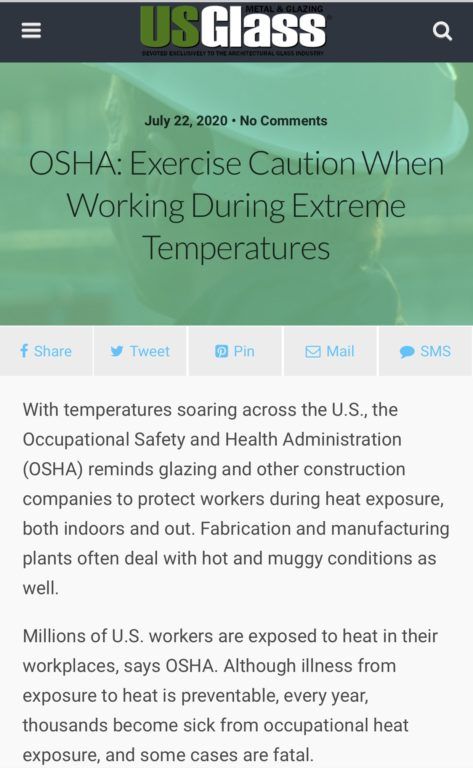
OSHA: Exercise Caution When Working During Extreme Temperatures
Posted on July 22, 2020 by Tara Taffera
With temperatures soaring across the U.S., the Occupational Safety and Health Administration (OSHA) reminds glazing and other construction companies to protect workers during heat exposure, both indoors and out. Fabrication and manufacturing plants often deal with hot and muggy conditions as well.
Millions of U.S. workers are exposed to heat in their workplaces, says OSHA. Although illness from exposure to heat is preventable, every year, thousands become sick from occupational heat exposure, and some cases are fatal.
Occupational risk factors for heat illness include heavy physical activity, warm or hot environmental conditions, lack of acclimatization, and wearing clothing that holds in body heat, according to OSHA.
Hazardous heat exposure can occur indoors or outdoors, and can occur during any season if the conditions are right, not only during heat waves, OSHA warns. Following are some tips on protecting against the heat.
- Consume adequate fluids (water and sport drinks);
- Work shorter shifts if possible;
- Take frequent breaks; and
- Identify any heat illness symptoms quickly.
Barbara Kotsos, director of marketing for Giroux Glass in Los Angeles, says the company, which has locations in California, Nevada and Arizona, follows OSHA’s standards for heat safety.
“As of 2017, the state of Nevada recommended that contractors follow OSHA standards for illness and injury due to heat. Prior to that everyone in Nevada followed the Nevada state health department guidelines,” she says. “It’s a challenge to stay cool outdoors in the desert, but we feel confident that the OSHA guidelines are well-thought out and, when followed, are successful at mitigating people getting sick from working in the heat.”
Craig Carson, director of preconstruction for Alliance Glazing Technologies, says that his company has even seen hot conditions in Denver this summer and is taking steps to protect its workers.
“One thing that we have been doing is making sure that our guys stay hydrated. And we have gone to these neck gaiters as face masks that can also be soaked in water. When this is done, they can offer a natural cooling as the water evaporates from the gaiter. This can be repeated as necessary,” he explains.
For additional guidance on how to protect you and your employees from heat stress click here.